Reviews
Prince
USA, 1986
Credits
Review by Abbey Bender
Posted on 31 December 2012
Source Warner Home Video DVD
Categories Rock Follies II
Under the Cherry Moon, Prince’s 1986 directorial debut, is an unquestionably ridiculous film. Ridiculousness doesn’t have to be a bad thing, though. In fact, the film has everything we want in a pop superstar vanity project—appealingly over the top visuals, delusions of grandeur, and perhaps, most importantly, the man himself clad in outfits ranging from a crop top and baggy, bejeweled jacket to a curious brocade tuxedo with tails in the front, that truly must be seen to be believed. The film had the dubious honor of winning five Razzie awards, even tying with Howard the Duck for Worst Picture. But does Howard the Duck feature Prince, in a bathtub filled with rose petals, playing with a toy boat while wearing a hat? No. So surely, there is no way that Under the Cherry Moon, silly as it is, can be considered The Worst.
Like any Rock Folly, the appeal of Under the Cherry Moon increases proportionally with one’s appreciation of the rock star. Prince’s impish charms are on full display in the film, and anyone who enjoys his fantastic facial expressions (which should, it seems, be most people) will be rewarded. There is, early in the film, a back and forth flirtation with a patrician, typically ’80s babe. Prince’s faces are straight out of the absurd flirting scene in Woody Allen’s Love and Death, although it isn’t entirely clear here whether Prince is mocking conventions of flirtation, as Allen so amusingly did, or subscribing to them, and making them even more ridiculous by virtue of his own over-the-top-ness.
The over-the-top is indispensible to Under the Cherry Moon. The film opens with a voiceover that introduces Prince’s character, Christopher Tracy, a man who “lived for all woman, but died for one.” What drama! That one special woman is Kristin Scott Thomas, in her first film role, and clearly a long way from doing Chekhov on Broadway. Thomas plays Mary Sharon, the heiress who Christopher falls in love with after initially planning to swindle her. Mary’s father is just the wealthy, completely snobbish type we would expect, and, of course, he’s no fan of Christopher. His attempt to keep his daughter and Christopher apart ultimately leads to Christopher’s death. But the plot isn’t really what’s important here. What’s most important is the fact that this is, as the credits grandiosely announce, “A Film By Prince.” From the moment the film begins, then, Prince positions himself as an auteur. If he is an auteur, his camera-stylo writes like a silver gel pen.
The film is black-and-white and meant to have a classical aesthetic, though it’s really pure slick ’80s music video pastiche. The lack of color does not suppress Prince’s lurid sensibility. In fact, it enhances it—everything in the film becomes more ridiculous by virtue of an aesthetic that means to reference Old Hollywood. At one point, early on, there’s even an iris transition. When Prince uses this technique, a hallmark of the silent era later appropriated by the French New Wave, what is he trying to say? Is it a literal wink at the audience, meant to acknowledge how the film knowingly straddles the line between good and bad, or is he really trying to leave some auteurist mark? This is the guy who changed his name to an unpronounceable symbol, after all. It’s difficult to tell, and so much the better for it.
There are aspects of the film that are more aesthetically interesting than they have any right to be, given its shameless vanity project status. Every time the French Riviera setting is shown, the camera swoops over the scene in a way that suggests all-encompassing decadence. At one point, while Christopher (or perhaps, it’s better to just call him Prince here, since the man doesn’t play anyone but himself) performs at the piano bar at a swanky restaurant, the camera makes a nicely sweeping, panoramic tracking shot that allows us to delight in all that garish luxury as he plays. Luxury and vanity are the two hallmarks of the film, so of course Mary, regal in poofy, shimmering dresses, is meant for Prince. The need for a luxurious life, the urgency of meaningful, soft-focus gazes of equally kohl-rimmed eyes, overrides any potential controversy over their mixed race relationship. There’s a montage in which Prince, his sidekick (and possible homoerotic companion, but that’s a whole other essay…) Tricky, and Mary go shopping. One of the stores they go to is called DIVA - a fitting epithet for all three of the characters. Prince is attracted to Mary’s Diva-ness, her rich-girl persona - we mustn’t forget she is first introduced at her twenty-first birthday party, which features elephants, fire-eaters, and the rich girl revealing herself in her “birthday suit.” At the same time, Mary recognizes the Diva quality in Prince—she can’t resist his brash, self-confident energy.
The ultimate expression of the film’s vanity project self-awareness comes near the end. Prince and Mary make out in a car, as Prince’s own “Kiss” plays. The extra-diegetic use of this song is perfectly narcissistic, and ideally suited to Prince’s self-styled auteur role here. Christopher and Mary don’t hear the music, but we know that the song is by Prince, and that there really isn’t any way for us to see Christopher as not Prince, and the fact that Christopher/Prince and Mary are kissing as “Kiss” plays is just too delightfully obvious. We can’t really expect anything less from the man who included with his album Controversy a giant poster of himself in the shower. Though the black-and-white diegetic world may threaten to take itself too seriously (indeed, a quick look at Wikipedia claims that Prince drew inspiration from Fellini), Prince’s high-heeled, puckish persona always keeps things playful, and he knows it. As he says early on, “I do nothing professionally; I only do things for fun.” This statement is mirrored in his dying words. His death delivers a heavy dose of soap opera cheese. Mary gazes at him, and he looks back at her with misty, made-up eyes, saying, “We had fun, didn’t we?” The remark is intended for both Mary and the audience. As we think of all the decadent, black-and-white landscapes, ridiculously garish outfits, and great music, we can look back at our playful pop pseudo-auteur and say yes.
More Rock Follies II
-
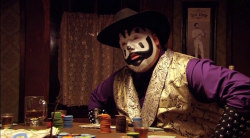
Big Money Rustlas
2010 -
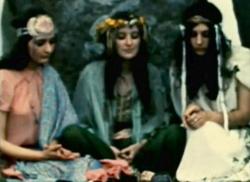
Be Glad for the Song Has No Ending
1970 -
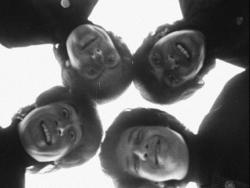
The Rutles: All You Need is Cash
1978 -
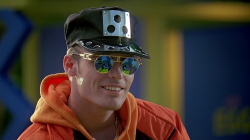
Cool As Ice
1991 -
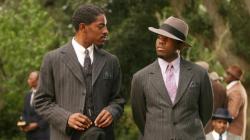
Idlewild
2006 -
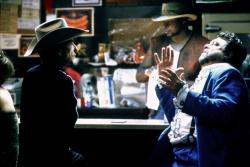
Masked and Anonymous
2002 -
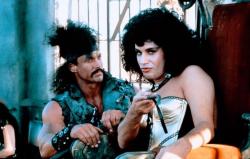
Never Too Young to Die
1986 -

Leningrad Cowboys Go America
1989 -
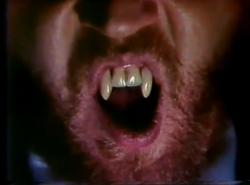
Son of Dracula
1974 -
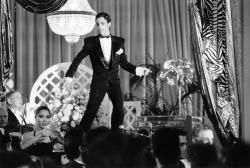
Under the Cherry Moon
1986 -

Purple Rain
1984 -
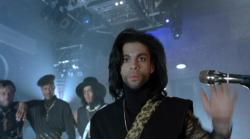
Graffiti Bridge
1990
We don’t do comments anymore, but you may contact us here or find us on Twitter or Facebook.



